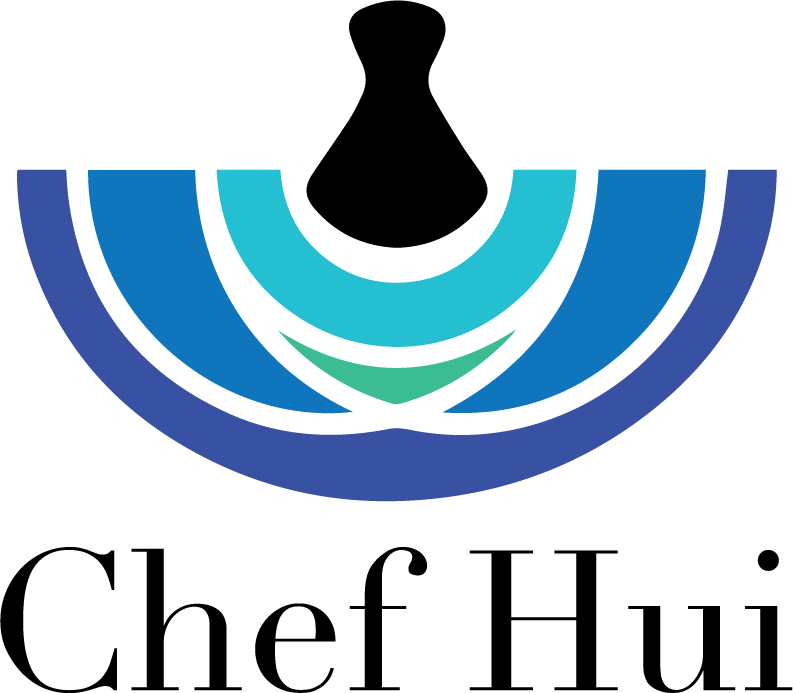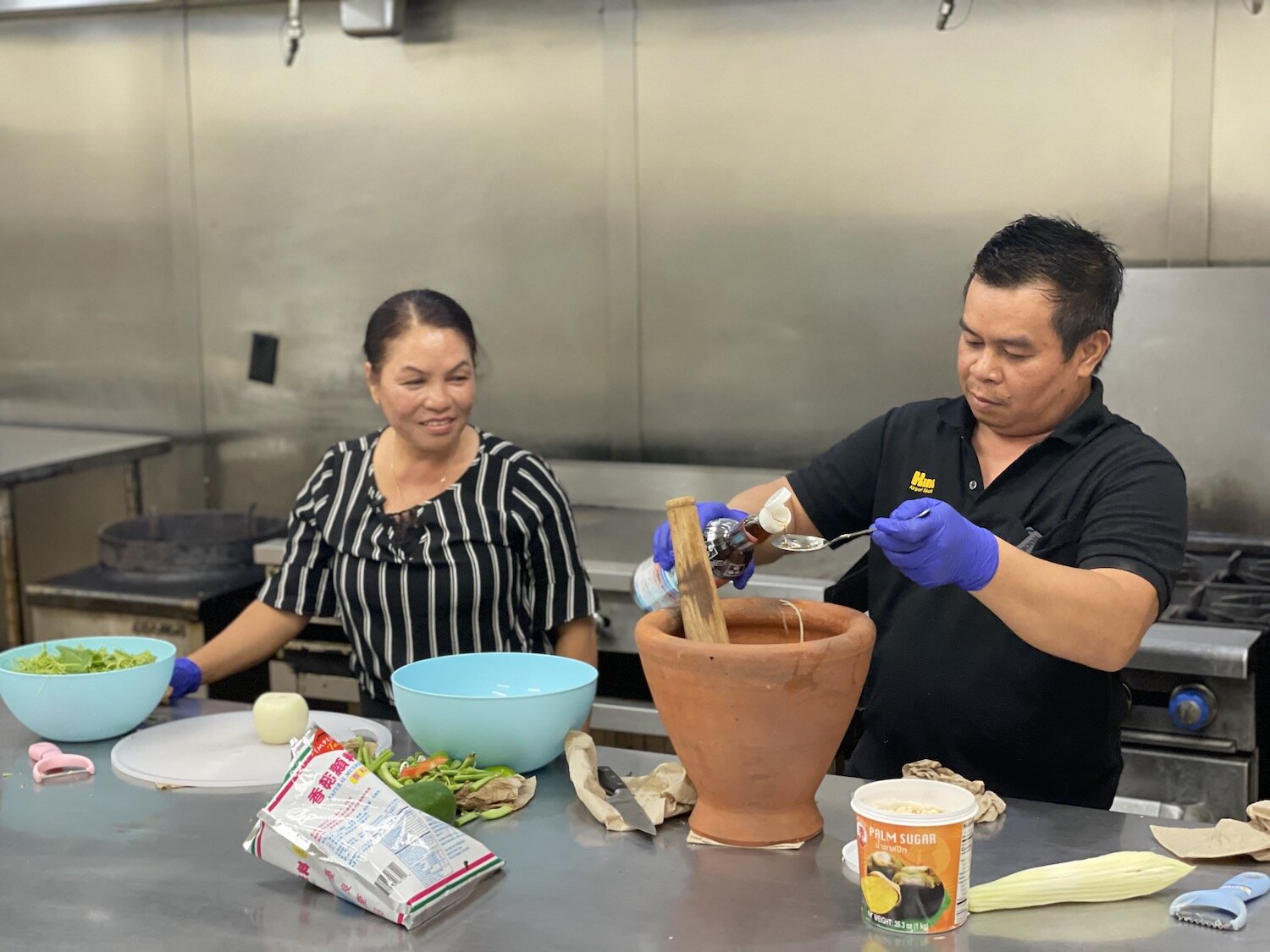If You Grow It, They Will Come: B.I. Farm
Written & Photographed by Sarah Burchard
Videography by Reel World Filmmakers
I never knew there was so much locally grown produce in Chinatown.
At least four produce stands in this neighborhood are owned by Pacific Gateway farmers.
If you walk down to Hotel and Maunakea at 6:00 a.m. any day of the week you can find Phayvanh Inthisane whacking the stems off silk squash with a cleaver, before displaying them neatly inside her produce shop. A steady stream of customers – some in aprons, others pushing tiny carts doing their daily grocery shopping – filter in and out filling their arms with big bunches of leafy greens, asking for specialty items, or picking up odds and ends for their restaurant down the street.
Phayvanh and her daughter teaching Luke about winter melon
An older woman comes in looking for bitter melon leaves. “Not today Auntie,” Inthisane tells her. Inthisane feels bad. She has been too busy to harvest some of the items her customers have been asking for, such as a big patch of ube that is begging to be dug up.
Inthisane is the owner of B.I. Farm – named after her husband’s, son’s, and grandson’s initials. By letting her customers dictate what she grows and maintaining a relentless curiosity for market needs she exceeds expectations and has become the go-to source for many residents and restaurant owners of Chinatown.
Sweet potato leaves
After arriving early to deliver the vegetables and open the shop, she is joined by her daughters Camyl and Angela. One stays behind the register, while the other unloads boxes of produce onto shelves offering cooking tips to inquiring customers. After they are set up, the daughters take over and Inthisane drives back to the farm.
For this episode of Farmers in the Kitchen, we had the opportunity to visit the impressive 9-acre B.I. farm in Kunia, witness Inthisane in action at her shop, and learn how she makes two of her favorite Thai dishes using the crops she grows with the help of her younger brother.
Born in Laos, Inthisane and her family fled to Thailand as refugees when she was just a baby. Because both of her parents were born in Thailand their time in the refugee camp was relatively short: one year. Dad was in the military and mom worked as a seamstress making silk clothing.
Courtesy of Phayvanh Inthisane
“My dad become Thai citizen when he took us to Thailand,” Inthisane explained. “But my mom, because the people ask money to do the paperwork, we didnʻt have, so we decided to come to United States.”
At age ten, Inthisane’s aunt sponsored her and her family to move to Oʻahu with the understanding that Inthisane’s dad would eventually pay her aunt back.
Waking up in their Moiliili apartment, the day after they arrived, Inthisane remembers feeling sad. She missed her home and her cousins, aunts, and uncles back in Thailand. She was not the only one, no one in her family was happy.
Three months later, they lost Inthisane’s younger brothers to a car accident.
To cope with the unbearable reality of losing a son, her dad bought a farm in Waimanalo with the intention of keeping the family’s minds focused on something productive rather than continue to suffer from compounding depression.
“It keep us busy,” Inthisane said. “We can see the green things, and itʻs outdoors. We donʻt have to sit inside the house and think.”
Every day, in the late afternoons, after her dad got off work and Inthisane got home from school, he took his family to the farm where they worked until sunset.
Inthisane continued in her mother’s footsteps and became a seamstress, but like her father who worked in the furniture business while maintaining a farm, she continued to farm on the side.
Eventually she started her own farm in Waialua. This was the home of B.I. Farm for 14 years before moving operations to the Pacific Gateway Center farmland in Kunia two years ago.
Inthisane and her husband Bo Inthisane remember arriving to overgrown weeds and dead trees.
Early days of B.I. Farm. Courtesy of Phayvanh Inthisane
“When we first start in this place, itʻs just like a jungle,” Inthisane said.
Starting from scratch they leveled the field, brought in keiki plants from their former farm and friend’s farms, lined the perimeter with banana trees, and started filling in gaps with crops of all kinds.
“He do the hard work,” Inthisane said about her husband. “He chop the land, he make them smooth, and clean, and then he lays all the plastic and the drip line. When itʻs time to plant he says, “Come.”
Inthisane appreciates the farm for the same reasons her dad did.
“It keeps me busy and keep me forget things,” she explained. “You know, I love green, I love mother nature and then when you turn around ... the mountain. Itʻs beautiful, yeah? Thatʻs the reason why.”
Bo Inthisane is just as passionate. He takes great care in maintaining a well manicured field.
“He likes the land look clean,” Inthisane said. “If the banana yellow – the banana leaf – no matter how tired he is, he cut them off. I say ‘go sit down,’ ‘no, theyʻre turning to be yellow, theyʻre gonna be look ugly!’ ‘I say “oh my goodness.’ [laughs]
At the shop, Inthisane pays close attention to consumer needs.
“In the marketplace, sometimes I go see what is the high demand and I try to do it,” she said. “Sometimes I grab the seed to buy the seed from them. I show my family, ʻthis is what I want to do.ʻ They listen, they say, ʻOK letʻs do it.ʻ They have to listen because I’m always the person in the market. I work here and I work there. I know what they need from there. And everyday they ask me, ʻwhat are you going to harvest?’”
Mani Phongsavath harvesting Thai bananas. Courtesy of Phayvanh Inthisane
The farm’s ample variety is a reflection of these interactions. She grows everything from purple dragon fruit to fish mint. That’s right, mint that smells like fish. (See the staggering list of what was growing on the farm the day we visited at the bottom of this article.)
“Chinese, they like squash to make soup,” Inthisane said. “So, I plant different squash for them.”
She plants several different kinds in fact, including, silk squash, winter melon, pumpkin, bitter melon, and chayote – an ingredient she highlights in the Shrimp and Vegetable Stir-Fry she demonstrated for us at the Pacific Gateway Center kitchen.
Lemongrass is another ingredient she grows in abundance, selling it to Vietnamese and Thai restaurant owners who frequent her shop.
“The local people here, they use it a lot,” she said.
Inthisane dabbles in medicinal plants too. A thick, healthy tree full of noni stands near the shed. She gifts the fruits to her customers to produce a fermented daily elixir believed by many to be the ultimate immunity booster.
Goji berries are also grown, but harvested for their leaves only.
“We sell them in a bunch,” she explained. “[Customers] throw in a soup. Itʻs medicine. Itʻs really good for you. They do the tea and drink. Itʻs really good for the body.”
Inthisane’s younger brother Mani Phongsavath accompanied her to the Pacific Gateway Center kitchen to lead the cooking demonstration. Phongsavath has cooked on O’ahu for 14 years. He even owned a Thai Food truck on the North Shore next to the Giovanniʻs Shrimp truck for 2 ½ years that was featured on the Travel Channel.
With the moves of someone who has spent time in a professional kitchen, he automatically wets two paper towels to place under his cutting board and mortar and lays his tools out neatly before he begins teaching us his method for Som Tam – the infamous green papaya salad that embodies the flavors of Northeast Thailand where he and his sister are from.
After pounding away with his mortar and pestle to create the iconic salad, he switches gears and moves on to a simple, yet elegant stir-fry of chayote, chayote greens, shrimp, and green beans to showcase more of the ingredients grown on the farm.
Inthisane stands at his side chopping vegetables, chiming in when she has something to add. It feels natural, since she is usually the one calling the shots in the family.
As matriarch, farm manager, store owner, and representative for B.I. farms, there isnʻt a moment when Inthisane is not answering a question, deciding what to deliver to Chinatown and when, managing her store, cooking for her family, or planting crops. The amount of work that gets accomplished daily under her watch is astonishing.
“At this age,” she said. “I say, ʻthank you,ʻ to my mom and my dad. They taught me how to work hard and I earn what I take. When I take money it's OK, as long as I can see them [her crops] growing then Iʻm happy about it.”
Phayvanh Inthisane
B.I. Farm is located in the Pacific Gateway Center Farms in Kunia on Oʻahu. You can purchase their produce from their shop in Chinatown, also called B.I. Farm.
B.I. Farm [market]
1120 Maunakea St. Honolulu
*Storefront is located on Hotel street between Maunakea and Smith in Chinatown
Current B.I. Farm product list:
Thai bananas
Fish mint
Lemongrass
Thai eggplant (2 types: white & striped green)
Winter melon (squash)
“Smooth” squash
Green papaya
“Buddha hand” squash (Chayote)
Hard winter squash
Luffa Silk Squash (Oyong)
Jackfruit
Okra
Goji berries
Gooseberry
Dill
Bittermelon
Ube
Chicos
Purple dragonfruit
Soursop
ʻUlu
Chinese ingredient in the potato family. Large red leaves. (Don’t know the name!)
Cassava
Banana leaves
Banana flowers
Taro (she harvests for luau leaf)
MInt
Holy basil
Basil
Malabar spinach
Garlic chives
Hin Choy (Vegetable Amaranth)
Cilantro
Culantro
















